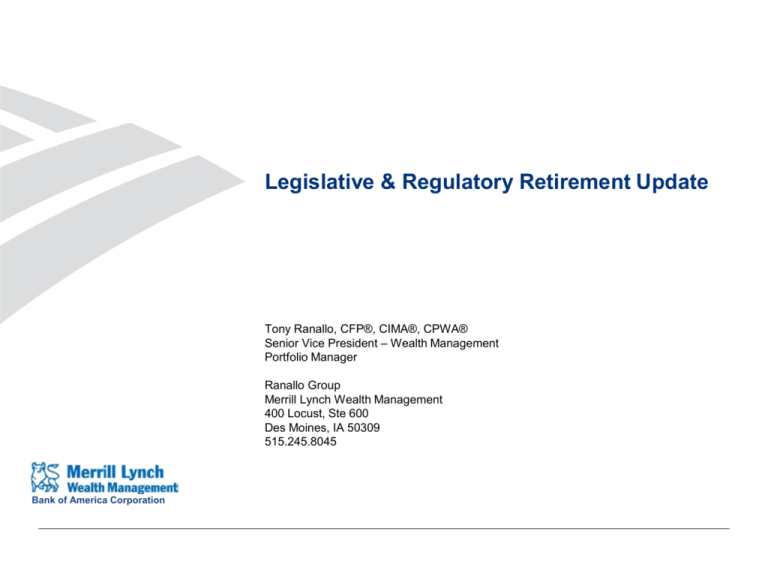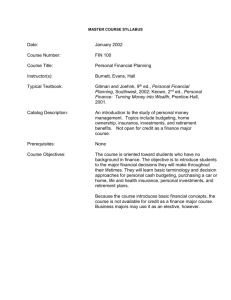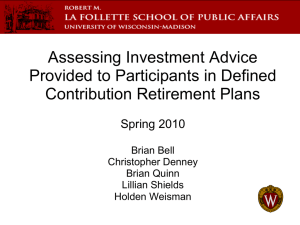
Legislative & Regulatory Retirement Update
Tony Ranallo, CFP®, CIMA®, CPWA®
Senior Vice President – Wealth Management
Portfolio Manager
Ranallo Group
Merrill Lynch Wealth Management
400 Locust, Ste 600
Des Moines, IA 50309
515.245.8045
Bank of America Corporation
Tony Ranallo, CFP®, CIMA®, CPWA® - Senior Vice President – Wealth Management, Portfolio Manager
Since he started in the financial services industry in 2002, Tony has specialized in working with
corporate retirement plans and qualified individuals, focusing on retirement asset accumulation
and distribution strategies. He now oversees The Ranallo Group at Merrill Lynch, one of the
largest wealth advisory teams in the state managing more than $300 million in assets for
individual and corporate clients.
Tony graduated Cum Laude from Arizona State University with a Bachelor of Science in
Finance and later completed his Masters of Science in Financial in Denver, Colorado.
Continuing to place an emphasis on education, Tony was one of the youngest professionals in
the country to attain the CERTIFIED FINANCIAL PLANNERTM (CFP®) certification, and later
completed the Retirement Plans Associate (RPA) designation in 2007.
He has also completed the CIMA® designation and recently completed the CPWA® program.
The Certified Investment Management AnalystTM (CIMA®) designation program is recognized as the standard for advanced
investment consulting. This credential communicates to clients and peers that the consultant has completed a rigorous process
reflecting a high level of competency, professionalism, and investment expertise. The program is dually sponsored by the Wharton
School of Business, University of Pennsylvania and the Investment Management Consultants Association (IMCA).
The Certified Private Wealth AdvisorSM (CPWA®) designation program is an advanced credential created specifically for wealth
advisors who work with high-net-worth clients on the life cycle of wealth: accumulation, preservation, and distribution. The program
is dually sponsored by the Booth School of Business, University of Chicago and the Investment Management Consultants
Association (IMCA).
Locally, Tony is active with numerous non-profit organizations. He is on the board of the Des Moines Community Playhouse and
works closely with several other local charities such as Amanda the Panda. Tony was a Business Record Forty under 40 selection
in 2014.
Tony resides in Waukee, Iowa with his wife Kimberly, their sons A.J. and Frankie, and daughter Peyton .
Bank of America Corporation
1
Frank the tank
Bank of America Corporation
2
Trends in the retirement plan market
Continued movement toward defined contribution plans
Government plans last to adopt 401(k) style plans
– Tennessee moving to hybrid 401(k) pension plan
More emphasis on participant readiness
Shift focus to participant outcomes, not just limiting liability to
fiduciaries
Consolidation of investment menus
Limit choices to reduce complexity to participants
Reduce investment overlap
Move to core asset classes vs. stylized asset classes (Midcap Blend
vs. Midcap Value and Midcap Growth)
Bank of America Corporation
3
Trends in the retirement plan market
Adding asset classes to allow for more diversification
Real Estate, Inflation Protected Bonds, Short Duration Bond
Liquid Alternatives
Move from actively managed funds to passive index funds
Lower cost and reduce tracking error to underlying benchmarks
Less liability for Fiduciaries from a monitoring standpoint
Guaranteed lifetime income offerings
Annuity like living benefits that guarantee income
Reduces risk of market volatility reducing retirement income, outliving
ones assets
Can be issues with portability when trustees move platforms
Bank of America Corporation
4
Proposed Fiduciary Rule
Brokers and financial professionals must act in fiduciary capacity when
working with retirement accounts
Must provide advice that’s in the best interest of the client
Current non-advisory accounts are held to a ‘suitability’ standard, not a
‘fiduciary’ standard like fee based advisory accounts
Advisors are not liable for investment selection in non-advisory,
brokerage accounts
Requires more extensive client profiling by the advisor, annual client
reviews, etc.
Bank of America Corporation
5
Proposed Fiduciary Rule
The proposed rule would affect the $24 trillion currently held in qualified
retirement account in the US
Battle Continue Over Fiduciary Rule for Retirement Investments. Wall Street Journal. June, 2015.
Bank of America Corporation
6
Proposed Fiduciary Rule
Complaints revolve around additional costs and liability
Compliance monitoring and administrative costs would increase
Internal systems and controls would need to be upgraded
Additional compliance specialists added, especially for smaller broker
dealers
Legal departments would have to be expanded
Qualified account holdings could be challenged by clients who feel
their investments ‘are not in their best interest’
Disclosures created to defend proprietary investment offering vs.
lower cost third party investments
Difficulties recommending insurance based products with high
expenses and long surrender periods
Bank of America Corporation
7
Proposed Fiduciary Rule
Summary
The rule would provide for a uniform fiduciary-duty rule across
retirement accounts, whether in a brokerage or fee based advisory
account
Proposed rule will have the largest affect on companies offering
brokerage and insurance solutions for qualified assets
Expected to reduce a firm’s ability to push proprietary firm sponsored
investments
Promote ongoing, active relationships between advisors and clients
with qualified assets
Bank of America Corporation
8
State Run Retirement Plans
The President’s 2016 fiscal budget would allot $6.5 million to support
several two-year pilot programs for states to experiment with ways to
expand private sector retirement options. Those include 401(k) plans
and individual retirement accounts, particularly for people whose
employers do not currently offer a plan.
State’s would create retirement plans, similar to health exchanges, for
employees that are not offered, or do not qualify for their company’s
retirement plan
Currently, 80% of workers have access to an employer sponsored
retirement plan
Of that, 80% are participating
Bank of America Corporation
9
Self Directed Brokerage Accounts
What are they?
Self-direct brokerage accounts remain part of plan assets, and as such
are subject to the same rules and regulations as the 401(k) plan. The
self-direct brokerage service is designed to give participants more
flexibility with their retirement planning by offering a brokerage
experience, while also allowing plan sponsors the ability to maintain
control.
30% of retirement plans offer a self directed feature
Usually found in large employer plans (greater than 5,000
employees)
Bank of America Corporation
10
Self Directed Brokerage Accounts
Plan Sponsors can:
Restrict the types of investments participants can choose from
Full investment capabilities
Mutual funds only
Equity/Fixed Income Investments only
Establish a minimum participant core account balance required prior to
opening a self-direct brokerage account
Establish maximum percentage of overall participant account balance
permitted in self directed brokerage account
Bank of America Corporation
11
Self Directed Brokerage Accounts
Department of Labor is considering requiring additional oversight for self
directed brokerage accounts by plan Fiduciaries
Many participants are not equipped with the financial knowledge to
select suitable investments
Some plans only allow self direction as a way to sidestep fiduciary
duties and not provide a core menu of investments
Most brokerage windows offer participants little to no guidance and
access to an almost unrestricted universe of investments
Bank of America Corporation
12
Self Directed Brokerage Accounts
Summary
Currently only a Request for Information by the Department of Labor
Expect more serious discussions if proposed Fiduciary Rule is passed
Many times, a self directed brokerage account is not in the best
interest of the participant
Universe of securities overwhelming
Portfolios tend to hold concentrated positions that are not in line with
a participant’s risk tolerance
Advisor replicates strategy in self directed brokerage account that
could be implemented in core plan for less cost
– Institutional vs. retail funds
– No trading cost in core plan, funds purchased at net asset value
Bank of America Corporation
13
Regulatory Update – Lifetime Retirement Income
The Department of Labor is considering requiring an abundance of new information on quarterly
participant statements
The projected account balance (in current dollars) at a participant or beneficiary’s normal
retirement age
An estimated lifetime income stream based upon the current account balance
An estimated lifetime income stream based upon the projected account balance
General Rule. Projections would be required to be based on “reasonable assumptions” taking into
account generally accepted investment theories, and would, at a minimum, require consideration of
future contributions, investment returns and inflation.
Safe Harbor. The DOL plans to include a safe harbor prescribing a specific set of assumptions for
future contributions, investment returns and inflation. As proposed in the Notice, the safe harbor
would assume that contributions increase at a rate of 3 percent per year, investment returns are 7
percent per year, and the inflation rate is 3 percent per year.
Current Balance
Projected Balance
$125,000
$557,534
Monthly Payment
Monthly Payment
$625
$2,788
Bank of America Corporation
Regulatory Update – Service Provider and Participant Disclosures
On February 3, 2012, the Department of Labor published final
regulations on fee disclosure for retirement plans that ultimately
became effective July 1, 2012.
Plan fiduciaries must ensure plan investment expense and
compensation to service providers are “reasonable”
Plan Service Providers must disclose via the 408(b)(2) disclosure the
fees they receive and the services they provide
Plan fiduciaries must disclose certain plan, fee, and investment
related information to participants via the 404(a) fee disclosures
Disclosures can be delivered electronically
Pending legislation to require a ‘guide’ to assist plan fiduciaries if fee
disclosure is contained in multiple or ‘lengthy’ documents
– Awaiting definition of ‘lengthy’
Bank of America Corporation
Legislative Update – Proposed Tax Reform
Limit traditional 401(k) contributions to 50% of 402(g) limit
$18,000 annual limit for 2015, maximum pre-tax contribution of $9,000
All other contributions must be made as Roth (after tax) contributions
Limit value of deductions to 28%
Those in tax brackets higher than 28% would pay taxes on a portion of
retirement plan contributions, health care plans
Lifetime limit on retirement savings
Proposal to tax future contributions once an individual has a balance
across all qualified plans that would fund a lifetime annuity of $205,000
per year beginning at age 62 ($3.4 million cap)
Reduce 415 limits in qualified plans (currently $53,000 for defined
contribution plans)
Eliminate catch-up contributions
Eliminate ‘Stretch’ IRA, force non-spouse inherited retirement accounts to
be fully distributed (and taxed) within 5 years
Required minimum distributions for Roth IRAs
Bank of America Corporation
Regulatory Update – 60 Day IRA Rollover
Beginning January 1st, 2015, you will only be allowed one 60 day IRA
rollover per 12 month period
Longstanding IRA guidance has allowed one rollover per IRA per 12
month period
Bobrow v. Commissioner – one rollover per taxpayer per 12 month
period
Individuals could borrow money from their IRA as long as they were
returned within 60 days
If they required another 60 day window to borrow funds, individuals could
do a direct transfer into a new IRA and be allowed another rollover period
If even one day late in repaying the IRA, investor will be liable for Federal
and State income tax on the amount distributed and possibly incur a 10%
excise tax if under age 59 ½.
Bank of America Corporation
Target Date Retirement Funds
Continue to attract almost 75% of qualified plan contributions
More in depth analysis is being made available to plan sponsors to
compare competing offerings (T. Rowe Price vs. Principal vs. Fidelity,
etc.)
These investments are the most important and most utilized
investments on most 401(k) plan menus
Proposed legislation call for more disclosures:
Graphical representation of the fund’s glide path
Notation of when the fund reaches its most conservative asset
allocation
Assumptions made by the fund regarding participant contribution and
withdrawal behavior, including whether funds are designed to take
participants “to” or “through” retirement
Bank of America Corporation
18
Tibble vs. Edison
Employees of Edison International argued that investments in the company’s
retirement plan were not properly monitored
Supreme Court ruled that plan sponsors have a continuing duty to review
investments in retirement plans
Must regularly review the investment lineup and remove imprudent
investments
– In this case, lower cost Institutional share class funds were available
instead of the retail share class that were used
6 year statute of limitations goes back to any time the investment was
offered, not the decision to add the investment
“ERISA’s fiduciary duty is derived from the common law of trusts, which
provides that a trustee has a continuing duty–separate and apart from the
duty to exercise prudence in selecting investments at the outset—to monitor,
and remove imprudent, trust investments.”
Bank of America Corporation
19
Active vs. Passive
Indexing (passive management) is an investment strategy that attempts to track a
specific market index as closely as possible after accounting for all expenses
incurred to implement the strategy. This objective differs substantially from that of
active investment managers, whose objective is to outperform their targeted
benchmark even after accounting for all expenses.
When utilizing active funds, Fiduciaries take the risk of underperformance and
tracking error to respective benchmarks
Actively managed mutual funds are more expensive
Difficult to consistently outperform benchmarks to make up for cost differential
Nearly impossible to consistently pick funds that will stay in the top quartile of
their peer groups
The case for index-fund investing. Vanguard. March, 2015.
Bank of America Corporation
20
Active vs. Passive
Percentage of actively managed equity funds underperforming benchmark for
five years ending…
The case for index-fund investing. Vanguard. March, 2015.
Bank of America Corporation
21
Active vs. Passive
Average dollar-weighted expense ratios as of December 31, 2014
The case for index-fund investing. Vanguard. March, 2015.
Bank of America Corporation
22
Questions?
Bank of America Corporation
23
Disclosures
The policy issues, status and views expressed are subject to change
without notice at any time. This brief is provided for informational
purposes only and should not be used or construed as advice or a
recommendation of any product, service, security or sector.
Bank of America Merrill Lynch is a marketing name for the Institutional Retirement, Philanthropy & Investments businesses of Bank of America Corporation. Banking and
fiduciary activities are performed globally by banking affiliates of Bank of America Corporation, including Bank of America, N.A., Member FDIC. Brokerage activities are
performed globally by brokerage affiliates of Bank of America Corporation, including Merrill Lynch, Pierce, Fenner & Smith Incorporated (MLPFS). MLPFS is a registered
broker-dealer, Member SIPC and wholly owned subsidiary of Bank of America Corporation.
Investment products:
Are Not FDIC Insured
Are Not Bank Guaranteed
May Lose Value
Certain associates are registered representatives with Merrill Lynch, Pierce, Fenner & Smith Incorporated and may assist you with investment products and services.
Bank of America Merrill Lynch makes available investment products sponsored, managed, distributed or provided by companies that are affiliates of Bank of America
Corporation or in which Bank of America Corporation has a substantial economic interest, including Columbia Management, BlackRock and Nuveen Investments.
© 2009 Bank of America Corporation. All rights reserved.
Bank of America Corporation




